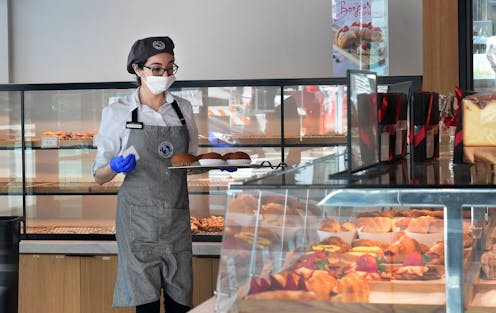Stimulus package will remain half-baked unless local governments get more of the dough
- Written by Stephanie Leiser, Lecturer in Public Policy, University of Michigan

Lawmakers are pinning their hopes on a US$2 trillion package[1] to prop up the U.S. economy and provide relief to individuals and business ravaged by the coronavirus.
The stimulus is expected to pump $150 billion in aid to state and local governments[2]. But with nearly 40,000[3] local governments across all 50 states, the money will be stretched thin and is likely to run out quickly. Many local officials are already bracing for severe budget shortfalls and mid-year cuts.
I study the fiscal health of local governments[4], and believe the federal government will need to do much more to provide relief to local governments in this crisis.
To understand why local governments are in such a vulnerable and precarious position as this pandemic-induced economic crisis begins, consider this analogy: local governments as “bakeries.”
Self-rising costs?
Imagine you are a bakery owner in a small town. The coronavirus pandemic has caused everything to shut down, but you get a call from your local school principal asking if you’ll give out free loaves of bread to local kids in need of meals. So you continue baking bread even as revenues from paying customers dry up.
As the weeks go by, you worry more and more about running out of cash. You consider a bridge loan but realize that’s not allowed – these “bakeries” are supposed to keep their budgets balanced. If revenues fall unexpectedly, they have to cut spending, hike prices or maybe dip into their reserves – if there are any.
Increasing prices is not feasible because your customers are in no position to pay more and, in in this analogy, would certainly vote against it. And you can’t cut production because you know the community depends on your bread. Reducing expenses will be tough because most of your costs are labor, and you don’t want to lay off employees or cut their wages. Oh, and you still have the mortgage to pay.
Fast forward to the end of the year. Revenues are down 20% but the good news is business is beginning to pick up. But don’t forget – many of these “bakeries” cannot let their revenues increase faster than inflation[5], now well below the pre-recession level of about 2.2%. If revenues start to recover too quickly, you’ll have to lower your prices to stay below the limit.
Best case scenario: It will take you about least 10 years just to get revenue back to where it was before, not counting inflation. Meanwhile, your expenses will continue to increase and somehow you’ll also have to shore up the emergency reserves you spent providing bread to kids when they couldn’t go to school.
An oven-ready solution?
The bakery’s situation may sound absurd, but it describes the conditions in which most local governments currently find themselves. In Michigan, where I teach, more than half of local governments say they are financially the same or worse off compared to 2008[6]. And in a spring 2019 survey, only 13% said they were very prepared for the next recession[7].
Like families and businesses, what local governments need in an emergency is liquidity. But unlike our fictional bakery, local governments are required by law to keep revenue and expenses in line[8] and cannot borrow to cover any revenue shortfalls. That’s why federal aid is so critical to ensure that local public health offices, water and sewer utilities, and first responders can continue to provide essential community service in the coming months.
Enduring this crisis will be painful for local governments, and strict limits[9] on revenue and expenditure growth will impede their recovery. If the stimulus package coming out of Washington fails to address the real constraints local communities face in battling coronavirus, we are likely to see unprecedented levels of fiscal stress and crisis in our cities, towns, and counties for years to come.
[Get facts about coronavirus and the latest research. Sign up for our newsletter.[10]]
References
- ^ US$2 trillion package (www.washingtonpost.com)
- ^ pump $150 billion in aid to state and local governments (www.forbes.com)
- ^ 40,000 (www.governing.com)
- ^ I study the fiscal health of local governments (fordschool.umich.edu)
- ^ cannot let their revenues increase faster than inflation (www.taxpolicycenter.org)
- ^ compared to 2008 (closup.umich.edu)
- ^ next recession (closup.umich.edu)
- ^ in line (www.urban.org)
- ^ strict limits (www.taxpolicycenter.org)
- ^ Sign up for our newsletter. (theconversation.com)
Authors: Stephanie Leiser, Lecturer in Public Policy, University of Michigan

